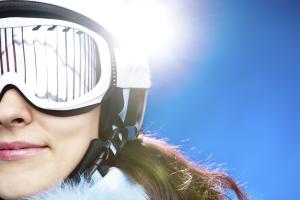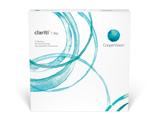
Did you know a day on the ski slopes can be more damaging to your eyes than a day at the beach? Many people stow away their sunglasses for the winter months, but to keep your eyes healthy and sharp, proper UV protection is essential all year round.
Why winter is rough on the eyes:
UV rays can come from both above and below in wintery conditions. Snow reflects nearly 80 percent of the sun’s rays while beach sand reflects only 15%. So when skiing or snowboarding, your UV exposure is nearly doubled.
Higher elevations on ski slopes means thinner air which allows more ultraviolet radiation into the atmosphere. UV radiation goes up 3 percent for every 1,312 feet of altitude, so on top of some mountains exposure can increase over 15%.
Overcast weather common in winter can be deceptive since visible light is reduced while UV light still gets through. This causes many to put away their sunglasses leaving their eyes unprotected.
How to protect your eyes:
It seems that many winter sports enthusiasts don’t realize the need for eye protection against the sun’s harmful rays. In a recent study published in the Archives of Dermatology, researchers found that, despite extremely high UV exposure, most skiers and snowboarders only took occasional precautions against the sun. Protective eyewear for winter sports has come a long way since the goggles Alaskan Inuits carved from caribou antlers to prevent UV exposure. The Vision Council recommends polarized or mirror coatings with amber tints which enhance contrast and minimize the glare from the snow.
Even if you’re not into skiing and snowboarding, it still is important to wear sunglasses. But don’t wear just any pair. Look for lenses that block 99-100% of UVB and UVA rays and lenses that meet ANSI Z80.3 blocking requirements. While contacts with UV blockers are no substitute for sunglasses, the more protection the better. CooperVision's clariti 1day family and Avaira family both feature a silicone hydrogel material with UV blocking.
Prolonged exposure to UV rays in winter can cause short term problems such as Photokeratities (Snow Blindness) or long term damage to your eyes such as macular degeneration or cataracts. But by using the right protective eyewear, you can keep your eyes safe throughout the season.





